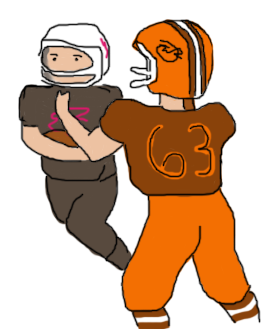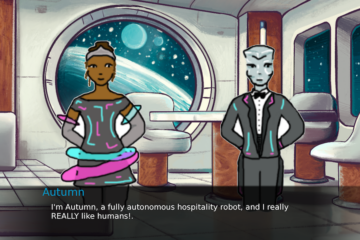Writing fiction, like any other art form, is about absorbing truths and experiences, and transferring them to your audience. We often get so focused on talking about techniques and words that we forget what it’s all in service of — namely, this transfer of an emotion I once felt to a stranger.
I was very lucky to have the chance to play a sport. It taught me what it felt like to reach for my physical limits. It taught me that I hadn’t known what those limits really were. I learned a great deal about myself, and by abstraction, about what it is to be human. And those are the experiences that help a writer create. So, while my brain is 98% full of the Cleveland Browns, I figured I’d stop and enumerate some of the valuable lessons I learned playing for the Cleveland Fusion.
Hard Work Beats Talent When Talent Doesn’t Work Hard
I can’t make myself one inch taller. Game day prep isn’t going to shave a minute off my mile. I can’t replace a rather indolent past with a more athletic one. No one can choose to be talented, but you can choose to work hard.
How does this apply to writing? I spent years thinking that the precious, undying prose would just FLOW from me if I were INSPIRED, and so my writing-life was full of rituals and mood-enhancers. Tempting the muse to visit with scented candles and music mixes centered on specific emotions. Free-writing in the hopes that brilliance would just appear. These techniques resulted in a whole lot of nothing.
Not coincidentally around the time I started playing for the Fusion, I changed my tactic to simply WORKING HARD. (Who has time to chase inspiration when you have three practices and two workouts every week?)
I used my limited time wisely, focusing on production. I churned out drafts. I revised them. I set regular deadlines for myself to complete stories and regular submission goals. This radically transformed my writing from hobby to career. I didn’t have new, better ideas. I was visited by no muse. I just did the work, one awful, terrible first draft at a time.
The More You Practice, The Luckier You Get
Ok credit where due — this was one I learned in heavy weapons fighting. I don’t remember who said it, one of the knights. After a fight went well, he praised me, and I said, “Oh, I was just lucky.”
With a little smile he said, “I’ve noticed, the more you practice, the luckier you get.”
Here’s the thing about Just Doing The Work … things that seem out of your control, like acceptances, end up happening more. It’s not that you really became more lucky, it’s just that you have put yourself in the situation where that dice roll can happen more often. If 1% of submissions are accepted, well, the quicker I send out one hundred submissions, the quicker I can bank on one acceptance.
The real benefit of practice is building up muscle memory. If you do a rip move 500 times a week, when you get to the game and you’ve got the offensive tackle bull-rushing you, you’ll rip her before you realize you’re doing it. Likewise, if you churn out drafts of stories, you start to get a feel for the shape of stories in general, and that makes your first drafts better, which makes your final drafts more successful.
Focus on what you can do today
You can’t look ahead to that big rival game. You gotta get this week’s game done. Likewise, as a writer, you gotta work on your draft, not plan on the next one. It’s definitely a marathon, not a sprint. Small to-do list items, incremental work, that’s the way forward.
If you’re planning your end zone dance or book release party and the contract isn’t signed or the ball hasn’t been thrown — that can trip you up and keep you from getting there. Focus on today, on what is in your hands.
Move with intention
When you go to tackle someone and you’re thinking “shit I’m not gonna be able to do this” or you’re holding back because you think this person maybe won’t get the ball … you play soft. You hit soft. You end up on your ass. “Be the hammer, not the nail,” our defense coach was always shouting at us.
When I was a newbie writer — for twenty years — I WROTE soft. I hedged my bets, kept things off-screen because I was afraid the reader would judge me or I didn’t trust my decision in the plot so I kept it vague in the hopes the reader had a better plot in their head. And that stuff does not work. You can’t cover zone and man at the same time – you’re not in the right position, and the play blows by you like you’re not even there. So these stories … the plot couldn’t be more than one thing at the same time, so it was essentially nothing, and I gave the slush readers an easy job rejecting me.
I don’t know how to stress enough how important it is to own your decisions, to let the story be ONE THING. It is a murder mystery or it is a caper or it is an epiphany – whatever you chose, own it.
I used to think that the more aspects I added to the story, the better. It could be a character exploration and a mystery and also have an experimental style and deal with some Big Issue and a new technology — no. I was muddying things, and it killed me in draft after draft. I didn’t trust any one of those things to stand on their own, and so they didn’t. If the quarterback doesn’t trust her receiver, she throws bad passes. If the halfback doesn’t trust the line’s blocking, she makes bad cuts. If you don’t trust your story to be what it was meant to be, you make bad writer decisions.
Ultimately, in writing as in competitive sports, leave it all on the field. No one’s gonna be around to see what you held back.



